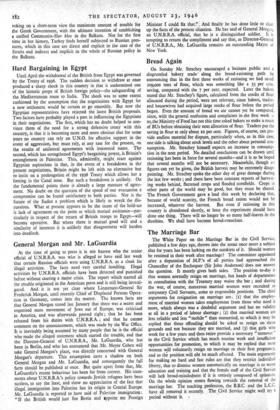Hard Bargaining in Egypt
Until April the withdrawal of the British from Egypt was governed by the Treaty of 1936. The sudden decision to withdraw at once produced a sharp shock in this country in that it undermined one of the historic props of British foreign policy—the safeguarding of the Mediterranean route to India. The shock was to some extent cushioned by the assumption that the negotiations with Egypt for a new settlement would be certain to go smoothly. But now the Egyptian representatives have rejected the latest British proposals. Two factors have probably played a part in influencing the Egyptians in their negotiations. The first, which has no doubt helped to con- vince them of the need for a strong defensive treaty with this country, is that it is becoming more and more obvious that for some years no country can rely on U.N.O. for effective support in the event of aggression, but must rely, at any rate for the present, on the results of unilateral agreements with interested states. The second, which has strengthened Egypt's bargaining power, is Britain's entanglement in Palestine. This, admittedly, might react against Egyptian aspirations in that, in the event of a breakdown in the present negotiations, Britain might be left with no alternative but to insist on a prolongation of the 1936 Treaty which allows her a footing in the Canal zone. But such a breakdown is unlikely. On the fundamental points there is already a large measure of agree- ment. No doubt on the question of the speed of our evacuation a compromise can be found satisfactory to both parties. Nor is the future of the Sudan a problem which is likely to wreck the dis- cussions. What at present appears to be the cause of the hold-un is lack of agreement on the point at which mutual assistance—par- ticularly in respect of the return of British troops to Egypt—will become operative. But where there is mutual good will and a similarity of interests it is unlikely that disagreement will harden into deadlock.


























 Previous page
Previous page